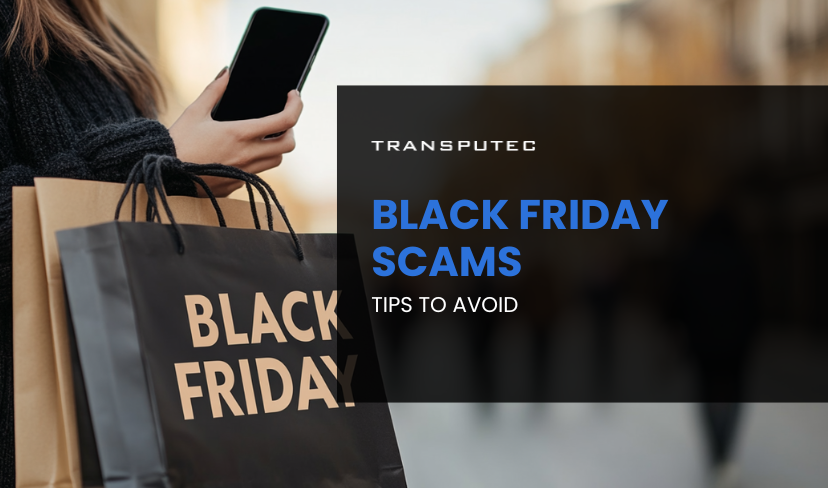Written by KRITIKA SINHA | MARKETING
As the holiday season approaches, the excitement of Black Friday deals can quickly turn into a nightmare for business owners and employees who fall prey to sophisticated scams. Every year, countless individuals lose significant amounts of money and sensitive information to cunning fraudsters who exploit the frenzy of discounted shopping. However, this year can be different.
In this blog, we will provide you with tips to avoid Black Friday scams and stay secure, covering essential strategies such as evaluating historical prices, identifying impersonation sites, using secure payment methods, and keeping your devices updated. By arming yourself with these expert tips, you can navigate the Black Friday sales with confidence and protect your financial and personal data from potential threats. Here’s how you can ensure a safe and successful shopping experience.
What Are Black Friday Scams?
Black Friday scams are deceptive tactics used by cybercriminals to exploit shoppers’ eagerness for discounts. These scams range from fake websites and phishing emails to counterfeit products and payment fraud.
According to a 2022 report by Cybersecurity Ventures, online fraud surged by 30% during the holiday shopping season.
Why Are Black Friday Scams on the Rise?
Black Friday is a prime opportunity for cybercriminals to exploit the rush of online shopping. As more consumers flock to the internet for incredible deals, the volume of transactions increases, creating the perfect environment for scams. Scammers take advantage of the excitement and urgency shoppers feel, often using tactics like fake websites, phishing emails, and counterfeit product offers. As e-commerce grows and shoppers become more comfortable with online purchasing, the risks of falling victim to these scams continue to rise.
With billions of dollars spent online during Black Friday, scammers see a lucrative opportunity. Popular scams include:
- Fake Retail Websites: Fraudsters create convincing websites to mimic legitimate brands.
- Phishing Emails: Messages promising exclusive deals are often a ploy to steal personal information.
- Counterfeit Goods: Low prices on luxury goods often indicate counterfeit products.
- Payment Fraud: Manipulated payment gateways trick customers into revealing credit card details.
10 Essential Tips to Avoid Black Friday Scams
With Black Friday attracting millions of online shoppers, scammers are always ready to take advantage of the chaos. To help you protect yourself, your business, and your customers, here are 10 essential tips to avoid Black Friday scams:
1. Shop Only on Trusted Websites
The first and most important step is ensuring that the website you’re buying from is legitimate. Always look for the “https://” prefix in the URL, as well as the padlock symbol next to it, indicating that the site is secure. Before making a purchase, verify the site’s authenticity by checking for contact information, customer reviews, and security certificates.
2. Avoid Unbelievable Deals
One of the most common tactics used by scammers is offering deals that sound too good to be true. If a discount seems extreme (such as 90% off an expensive product), it’s likely a scam. Counterfeit products or services often come with enticingly low prices. Do your research and compare prices from multiple reputable sources to ensure the deal is legitimate.
3. Verify Retailer Authenticity
Before purchasing, always confirm that the retailer is genuine. Fraudulent websites often create URLs that closely resemble those of reputable brands. For example, instead of “amazon.com,” a scam site might use “amaazon.com” with extra letters or misspellings. If you’re unsure, go directly to the brand’s website by typing the URL into your browser rather than clicking on links from emails or ads.
4. Use Credit Cards Instead of Debit Cards
When shopping online, it’s safer to use a credit card rather than a debit card. Credit cards offer better fraud protection, allowing you to dispute charges more easily in case of unauthorised transactions. Debit cards, on the other hand, are directly linked to your bank account and could result in greater financial loss if compromised.
5. Watch Out for Phishing Emails
Phishing emails are designed to trick you into revealing personal information or clicking on malicious links. Be cautious of unsolicited emails claiming to offer limited-time Black Friday deals. Always double-check the sender’s email address and avoid clicking on links or downloading attachments from unknown sources. If in doubt, contact the retailer directly through their official website.
Protect your Business 24/7 with Transputec!
Our Managed SOC Cost Calculator estimates potential expenses for security tools and other costs based on your requirements.
6. Enable Multi-Factor Authentication (MFA)
Multi-factor authentication adds an extra layer of protection to your online accounts. Even if a scammer manages to obtain your password, they won’t be able to access your account without the second form of verification. Enabling MFA on your online shopping accounts and payment platforms is a crucial step in securing your personal information.
7. Avoid Public Wi-Fi for Transactions
Public Wi-Fi networks are a favourite target for hackers looking to intercept sensitive data. If you must shop while on the go, avoid making purchases over public Wi-Fi. Instead, use a secured, private network or a Virtual Private Network (VPN) to protect your connection and prevent unauthorised access to your data.
8. Check for Clear Return Policies
A trustworthy retailer will always provide clear and easy-to-understand return and refund policies. Be wary of sites that don’t have this information readily available or seem overly complicated. If a website lacks return information or has vague terms, it could be a red flag that the retailer isn’t legitimate.
9. Monitor Your Bank Statements
Regularly check your bank and credit card statements during the Black Friday season. Look for any unauthorized transactions or charges from unfamiliar sources. Early detection can help prevent significant financial losses and allow you to take immediate action, such as reporting the issue to your bank.
10. Keep Your Antivirus Software Updated
Having up-to-date antivirus software can help prevent malware, viruses, and phishing attacks that might be used to steal your personal information. Many antivirus programs also provide browser extensions that can warn you about potentially unsafe websites, providing an additional layer of protection while you shop.
How to Spot a Fake Website
Identifying fake websites is crucial to avoid scams. Look out for the following signs:
- Misspelt Words: Scammers often create websites with spelling errors to mimic legitimate ones.
- Unusual Domain Names: A trustworthy brand won’t use obscure or extra-long URLs.
- No Contact Information: Legitimate businesses provide customer service contact details.
A study by TransUnion revealed that 25% of online shoppers fell victim to fake websites in 2021. Knowing these signs can help you avoid being another statistic.
What To Do If You’ve Been Scammed
Taking swift action after being scammed is crucial for reducing financial loss and preventing further damage to your personal information. By following these five steps, you can better protect yourself and recover from a scam.
1. Contact Your Bank or Credit Card Provider
If you’ve made a payment using your bank account or credit card, reach out to your financial institution right away. Report the fraudulent transaction and request that they freeze your account or cancel the card. Many banks offer fraud protection services and may be able to reverse the charge if it’s reported promptly.
2. Change Your Passwords
If you entered your personal or financial information on a fake website, it’s crucial to change the passwords for your online accounts—especially your banking, shopping, and email accounts. Choose strong, unique passwords and enable multi-factor authentication (MFA) for added security. This can help prevent further unauthorised access.
3. Report the Scam to Authorities
Report the scam to local law enforcement and relevant organisations such as the Federal Trade Commission (FTC) in the U.S. or Action Fraud in the UK. Filing a report not only helps you but also aids authorities in tracking down scammers and preventing future crimes. Keep all evidence, including emails, screenshots, and transaction details, to support your case.
4. Monitor Your Financial Accounts
Even after reporting the scam, continue to monitor your bank and credit card statements for any further suspicious activity. Set up alerts for transactions or large purchases to stay on top of your finances. Regularly checking your accounts can help you catch additional fraud early and take swift action if needed.
5. File a Dispute with the Merchant or Payment Platform
If you purchased a legitimate payment platform (like PayPal or a credit card processor), file a dispute or chargeback to recover your funds. Payment platforms often have buyer protection policies that can help you get your money back if the transaction was fraudulent. Be prepared to provide all relevant documentation to support your claim.
Conclusion
Black Friday can be a great time to snag some fantastic deals, but it’s equally important to stay vigilant and protect yourself from scams. By following these tips to avoid Black Friday scams, you can ensure a safe and enjoyable shopping experience.
At Transputec, we specialise in cybersecurity solutions tailored to protect individuals and businesses from online threats. Whether you need proactive monitoring, fraud detection, or training to recognise scams, our experts are here to assist. Stay secure this Black Friday with cutting-edge protection.
Contact Transputec today to speak with our cybersecurity experts and ensure your online safety.

Secure Your Business!
Ready to explore how we can enhance your security posture? Contact us today to speak with one of our experts.
FAQs
What are some common signs of a Black Friday scam?
Common signs include unrealistically low prices, recently created websites or social media accounts, emails or messages with typos and grammatical errors, and requests for payment via bank transfer. Always verify the URL and check for the ‘https’ and padlock symbol to ensure the site is secure.
How can I protect my payment information during Black Friday shopping?
Use credit cards or trusted platforms like PayPal, which offer better fraud protection and easier refunds. Avoid saving your payment details in browsers; instead, use a robust password manager. Consider using virtual credit card numbers that can be cancelled if compromised.
What should I do if I suspect I’ve fallen victim to a Black Friday scam?
Immediately contact your bank or credit card provider to report the incident. Request that they cancel any suspicious transactions and issue new cards if necessary. Also, report the scam to the relevant authorities, such as Action Fraud in the UK.
How can I ensure the website I’m shopping on is legitimate?
Check the URL for any typos or discrepancies, ensure it starts with ‘https’ and has a padlock symbol, and verify the domain using tools like Who. Is. Also, look for an ‘about us’ page, a postal address, and a privacy policy. Shopping from well-known brands or local businesses can also provide peace of mind.
What are the benefits of using multi-factor authentication (MFA) during Black Friday shopping?
MFA adds an extra layer of security to your accounts by requiring a second form of verification, such as a code sent to your phone or a biometric scan. This makes it much harder for scammers to gain unauthorised access to your accounts, even if they have your password.






